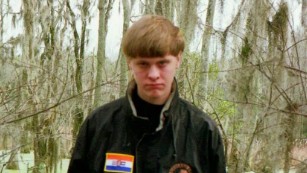Update From CNN: http://www.cnn.com/2015/06/19/us/charleston-church-shooting-suspect/
Dylann Roof has been charged with nine counts of murder and possession of a firearm during the commission of a violent crime in this week's shooting at a historic black church in Charleston, South Carolina, police tweeted Friday.
Roof is expected to have a bond hearing in a South Carolina court at 2 p.m. ET Friday, according to Charleston police.
[Previous story, posted at 10:07 a.m. ET]
For Dylann Roof's friends, talk of sparking a race war or wanting segregation reinstated was nothing new.
But then again, they didn't think he was serious.
After all, they had known him for years.
"He never targeted a specific black person," his roommate Joey Meek told ABC News. "He never did any of that, so it was just pretty much a shock."
Meek didn't take his claims about Roof to authorities before Thursday morning, the day after nine people were killed at
Emanuel African Methodist Episcopal Church in Charleston, South Carolina, ABC reported.

Dylann Roof is escorted from the Cleveland County Courthouse in Shelby, North Carolina, on Thursday.
EXPAND IMAGE
Roof is now in custody, having been caught by police about 245 miles (395 kilometers) away from the carnage in Shelby, North Carolina.
He confessed to the shootings in interviews with the Charleston police and FBI, two law enforcement officials told Evan Perez and Wesley Bruer of CNN, the first network to report this development. He also told investigators he wanted to start a race war, one of those officials said.
Friends and family
John Mullins, who attended White Knoll High School with Roof, told CNN on Thursday that the suspect was "kind of wild" but not violent.
"That's why all this is such a shock," Mullins said.
The classmate recalled Roof occasionally making racist comments, though he appeared to have black friends at the same time.
"They were just racist slurs in a sense," he said. "He would say it just as a joke. ... I never took it seriously, but now that he shed his other side, so maybe they should have been taken more seriously."
Roof repeated the ninth grade at the Lexington County high school, said Mary Beth Hill of the Lexington School District, west of Columbia, South Carolina. She said he was "very transient," that he "came and went."
In a
Washington Post interview, Roof's uncle, Carson Cowles, said his mother "never raised him to be like this."
Police are investigating the shooting as a hate crime.
"The whole world is going to be looking at his family who raised this monster," Cowles told the Post. "I'd be the executioner myself if they would allow it."
Before opening fire
Roof spent about an hour at the historic African-American church before the massacre, attending the prayer meeting with his
eventual victims, Charleston police Chief Greg Mullen said.
Witnesses told investigators the gunman stood up and said he was there "to shoot black people," a law enforcement official said.
He answered one man's plea to stop by shooting him, said Sylvia Johnson, a cousin of the church's slain pastor who has talked to a survivor.
"'No, you've raped our women, and you are taking over the country," he said, according to Johnson. "... I have to do what I have to do."
Investigators are looking into whether Roof had links to white supremacist or other hate groups, a law enforcement official said. There's no indication so far that he was known to law enforcement officials who focus on hate groups.

A former schoolmate of Dylann Roof's described him as "kind of wild" but not violent.
EXPAND IMAGE
In an image tweeted by authorities in Berkeley County, South Carolina, Roof is seen wearing a jacket with the flags of apartheid-era South Africa and nearby Rhodesia, a former British colony that a white minority ruled until it became independent in 1980 and changed its name to Zimbabwe.
Banned from mall
The months leading up to the shooting were a mix of troubling and odd.
Police in his hometown of Columbia -- about 120 miles northwest of Charleston -- obtained a warrant for his arrest in early March. He had been picked up on drug charges a few days earlier at Columbiana Centre mall, according to a police report.
Workers at two stores told mall security that Roof was acting strangely, asking "out of the ordinary questions," the police report said.
Roof initially said he wasn't carrying anything illegal. But he agreed to be searched, and an officer found "a small unlabeled white bottle containing multiple orange ... square strips" in his jacket, the police report said.
They turned out to be Suboxone, which is used to treat opiate addiction, according to the police report. Roof said he got the strips from a friend.
He was arrested on a drug possession charge that day in late February, but it's unclear why the March 1 arrest warrant was issued.
On April 26, police were again called to Columbiana Centre because Roof, who had been banned from the mall for a year after his drug arrest, had returned, the police report said. The ban was extended to three years after his second arrest.
The gun
Roof turned 21 in April, and a short time later he had a gun.
On Thursday, investigators did a trace of the handgun used in Wednesday's shooting and determined that it was a .45-caliber handgun Roof purchased from a Charleston gun store in April, two law enforcement officials told CNN's Perez and Bruer.
His grandfather says Roof was given "birthday money" and that the family didn't know what he did with it
CNN's Ray Sanchez,
Laura Smith-Spark, Greg Botelho, Paul Murphy and Brian Todd contributed to this report.




